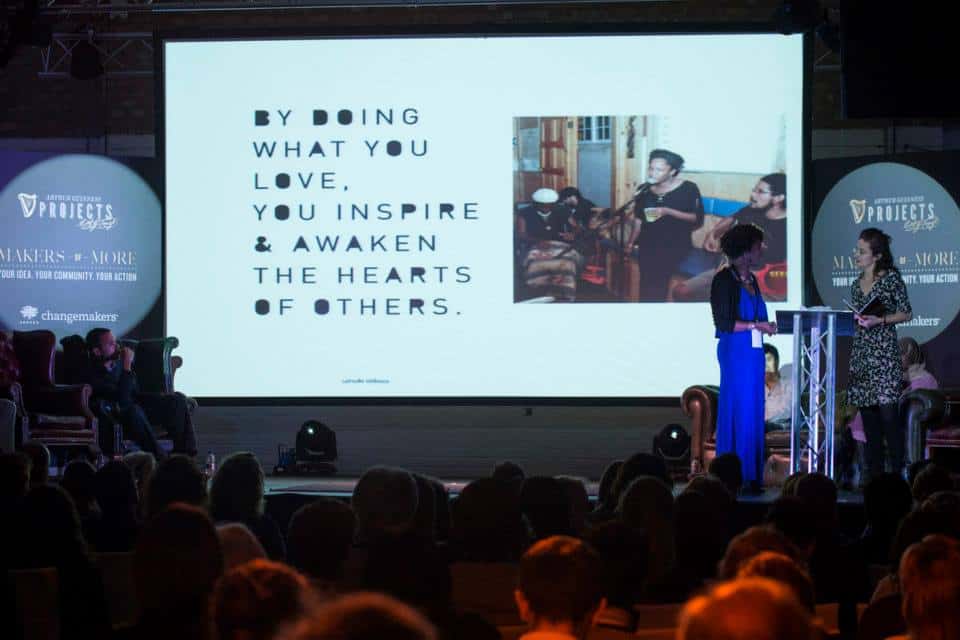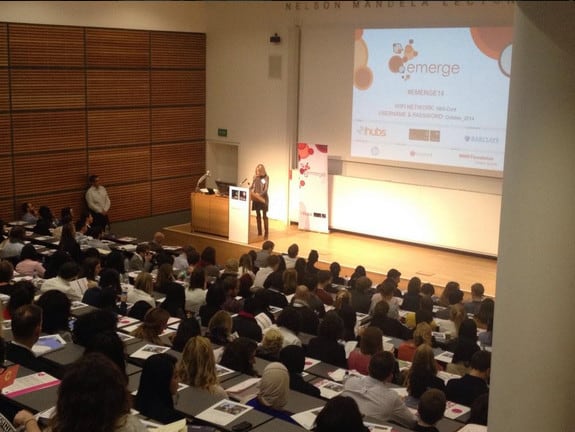For those of you who were on Twitter over the weekend, you might have seen the incredible #Emerge14 action coming from the Said Business School in Oxford. This was thanks to our annual Emerge Conference, in partnership with the Skoll Centre for Social Entrepreneurship. Over 350 university students, young professionals and current global change-agents came together to explore current issues and opportunities in social enterprise here in the UK and around the world.
This was the second big social enterprise event I’d been to in a week, having also attended the Makers of More summit hosted by Ashoka UK and Arthur Guinness Projects. The summit was attended by 250 people from across the globe to learn from and exchange ideas with some of the world’s most inspiring social entrepreneurs.
These two events, hosted by different organisations in different cities, offered great insights into the individual journeys of social entrepreneurs. Yesterday, as I was reflecting on the panel discussions and keynote speeches from the two events, it struck me that despite differences in the social entrepreneurs’ backgrounds, causes, locations, and career progression, there was clear consensus on the skills and qualities required to be a great social entrepreneur.
In my opinion, these skills and qualities fall into two complementary categories; one category focuses on the individual, and the other focuses more on their interaction with the people and environment around them.
The individual: Perseverance, risk-taking, stubbornness, self-belief
At both Makers of More and Emerge, it was clear that every social enterprise starts with the same thing: an individual who is frustrated by a particular injustice that they see or hear about in their local or global community. On Sunday, over a dozen social entrepreneurs pitched in a competition hosted by Mustard Seed to win £500k, and their passion for their respective projects was apparent to everyone in the room.
Once you’ve got that motivation, you’ll have to take risks and have a lot of self-belief to get started. “There will always be a voice saying ‘no’ and it won’t go away,” said Liam Black, “At one stage you’ll just have to jump.” To maintain single-minded focus on that issue requires stubbornness, or as Ken Banks, Founder of kiwanja.net and Frontline SMS, said at Makers of More, “you’ve got to be willing to challenge the status quo again and again.”
It was also clear that once you get going, there is no room for complacency; perseverance and fearlessness are crucial to maintaining momentum and overcoming the inevitable obstacles.
Their interactions: Empathy, humility, connections, open-mindedness
The way in which social entrepreneurs take their stubbornness and self-belief and turn it into impactful projects is very dependent on the way in which they interact with the people and environment that surrounds them. While self-belief is crucial, there is no place for egos in social enterprise; you have to be humble and accept that you will make mistakes along the way. And while a certain amount of stubbornness is also essential, this needs to be balanced by empathy and a commitment to truly understanding the people around you. Harish Hande, Founder of SELCO, advised everyone at Emerge to “seek to understand the basics of what people need.” At Makers of More, Pamela Chng, Founder of Bettr Barista in Singapore, also stressed the importance of acknowledging and facing the fears of those who are affected by the issue you are tackling.
While the spotlight at both events was on the individual founders of social enterprises, they were all quick to highlight the importance of their teams, networks and support circles. “It’s important to surround yourself with the right people who will encourage and challenge you to go further,” said Alexander McLean, Founder of the African Prisons Project in Uganda, at Makers of More. At Emerge, Charmian Love, Co-Founder and Director of Volans, advised us all to, “build your own personal advisory board” which I thought was a fantastic way of thinking about it.
Overall, if I had to pull out one theme from across the two events, it would be the ability of fantastic leaders to enable others and take lots of people on their journey with them, therefore amplifying their collective impact. Kathleen Britain, Head of Community Investment for Barclays in the UK and Europe, described this wonderfully, saying that once you’ve climbed the ladder, you should reach back down and pull the ladder up a bit so that it’s shorter for the next person.
I believe that the students that we work with at Student Hubs are in a fantastic position to do just that. Not only do they have close bonds and networks at university, but they are also part of a generation that is more likely to volunteer than donate to charity, willing to take initiative and get stuck in. At our ten univerisity Hubs, word of mouth is the main response to the question “How did you hear about us?” and we want to keep it that way, because enabling students to engage their peers and effect social change has an exponential effect on the student population now and their local and global communities in the long run.
Watch the highlights from Makers of More
Catchup on the Twitter action from Emerge 2014



